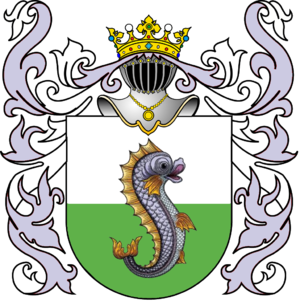Prince of Whales: Difference between revisions
Continuator (talk | contribs) mNo edit summary |
|||
| Line 1: | Line 1: | ||
[[File:Whales coa.png|thumb|right|Coat of arms of [[Daniyal ibn Daniyal Simrani-Kalirion]] as the [[Prince of Whales]]]] | [[File:Whales coa.png|thumb|right|Coat of arms of [[Daniyal ibn Daniyal Simrani-Kalirion]] as the [[Prince of Whales]]]] | ||
The '''Prince of Whales''' (if held by a woman known as the '''Princess of Whales''') is the demesnal head of all parts of the government of [[Whales]]. The incumbent prince is [[Daniyal ibn Daniyal Simrani-Kalirion]] (since | The '''Prince of Whales''' (if held by a woman known as the '''Princess of Whales''') is the demesnal head of all parts of the government of [[Whales]]. The incumbent prince is [[Daniyal ibn Daniyal Simrani-Kalirion]] (since 1703). | ||
The office of prince brings the style ''His Grace''. Daniyal, however, holds a greater style, ''Imperial Highness'', why he is properly titled so. In the event of a commoner inheriting the princely throne, the style will revert to ''His Grace''. | The office of prince brings the style ''His Grace''. Daniyal, however, holds a greater style, ''Imperial Highness'', why he is properly titled so. In the event of a commoner inheriting the princely throne, the style will revert to ''His Grace''. | ||
Revision as of 20:25, 12 January 2022
The Prince of Whales (if held by a woman known as the Princess of Whales) is the demesnal head of all parts of the government of Whales. The incumbent prince is Daniyal ibn Daniyal Simrani-Kalirion (since 1703).
The office of prince brings the style His Grace. Daniyal, however, holds a greater style, Imperial Highness, why he is properly titled so. In the event of a commoner inheriting the princely throne, the style will revert to His Grace.
Order of succession
The Constitution dictates: "The title of Prince of Whales shall be governed by the law of absolute primogeniture among a late Prince's legitimate descendants, with respect to the primacy of a late Prince of Whales' will. Without a will, and without legitimate descendants, the title shall pass to Prince Kir's father's descendants under the same law of absolute primogeniture."
As such the Order of succession is as follows, in its complete form:
- Lady Isabella Miranda Noor, Dowager Countess of Highpass, only child born in wedlock)
- Count Oze IV of Highpass, eldest child of the Dowager Countess of Highpass
- Lady Alexandra Maria Niit n Taag, second child of the Dowager Countess of Highpass
- Lord Jaan Humboolt Lasse Niit n Taag Prutt, only child of Lady Alexandra
- Lord Lasse Jaas Ozymandias Niit n Taag, third child of the Dowager Countess of Highpass
- Lord Jaas Humboolt Niit n Taag, fourth child of the Dowager Countess of Highpass
- Prince Ichirō, eldest son of Prince Kir
- Prince Jirō, second son of Prince Kir
- Princess Enhei, third child, first daughter of Prince Kir
- Kaiseress Salome, eldest sister of Prince Kir
- Prince Kian, twin sister of Prince Kir
- Prince Rubin, youngest brother of Prince Kir
- Prince Atreyu, eldest nephew of Prince Kir through Rubin
- Prince Valdemar, second-eldest nephew of Prince Kir through Rubin
- Princess Farzana Casimira, niece of Prince Kir through Rubin.
Kaiseress Salome, sister of Kir, was originally the heir apparent to the princely throne, but after Salome removed Kir from the line of succession to the Golden Mango Throne, Kir removed Salome and her descendants from the line of succession to the Whales throne. Kir also stipulated that no prince of Whales may concurrently be kaiser of Shireroth. Upon Kir's death, and the passing of the throne to Daniyal ibn Daniyal Simrani-Kalirion, that stipulation became void, after which Salome was returned to her constitutional place in the line of succession.
